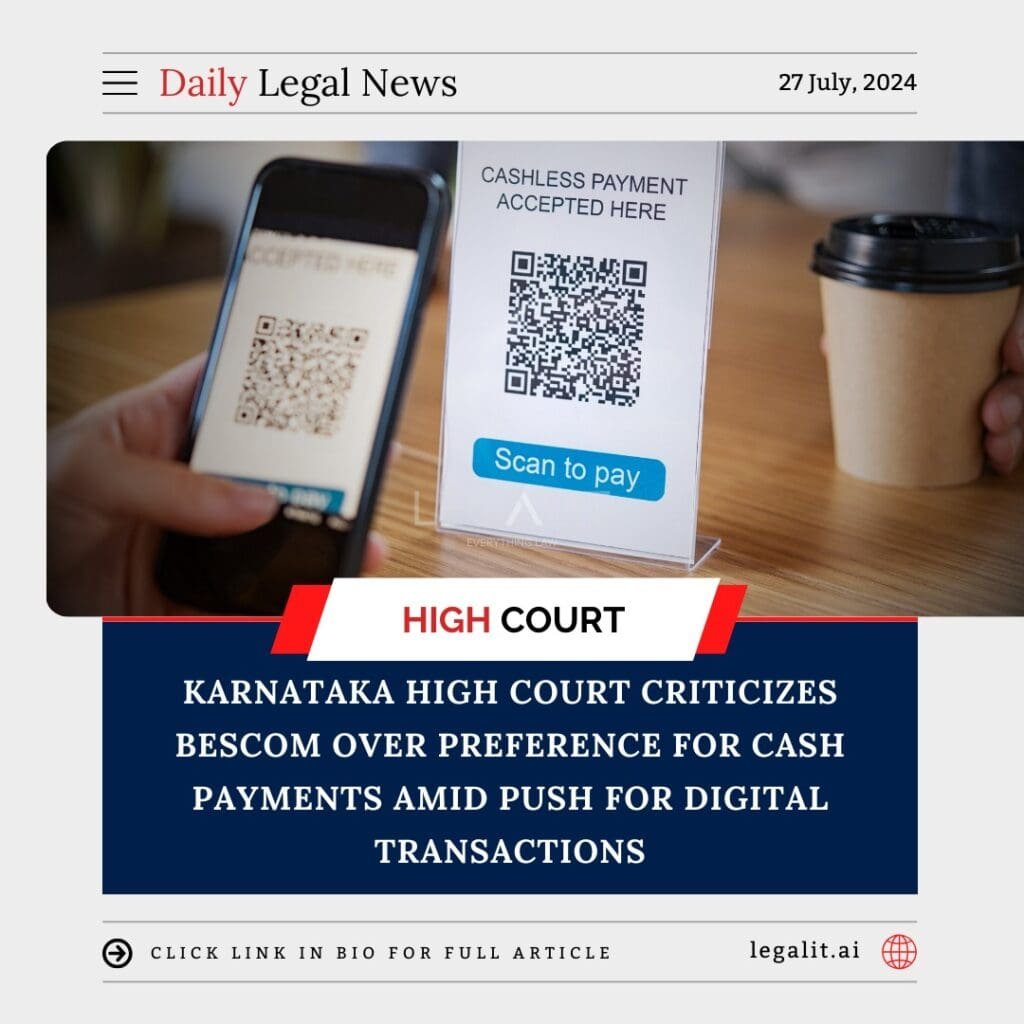
In a recent judicial rebuke, the Karnataka High Court criticized the Bangalore Electricity Supply Company (BESCOM) for its insistence on cash payments, despite the government’s strong push for digital transactions. The court’s remarks underscore the need for public sector entities to align with national initiatives promoting digital payments and financial inclusion.
Background of the Issue
The case emerged when a petitioner challenged BESCOM’s preference for cash payments for certain services, arguing that this practice contradicts the government’s extensive efforts to encourage digital transactions. The petitioner highlighted the inconvenience and inefficiency caused by the reliance on cash, especially in an era where digital payment systems are becoming increasingly prevalent and accessible.
The government of India has been advocating for a digital economy, emphasizing the benefits of transparency, convenience, and security that digital transactions offer. Initiatives like Digital India and various incentives for using digital payment methods are part of this broader strategy.
Court’s Remarks
During the hearing, the Karnataka High Court expressed strong disapproval of BESCOM’s insistence on cash transactions. Key points from the court’s observations include:
- Alignment with Government Initiatives: The court pointed out the inconsistency between BESCOM’s practices and the government’s push for a cashless economy. It emphasized that public sector entities should support and facilitate the transition to digital payments.
- Inconvenience to Citizens: The court noted that insisting on cash payments imposes unnecessary inconvenience on citizens, particularly when digital alternatives are available and widely promoted. It highlighted the need for public services to prioritize customer convenience and efficiency.
- Modernizing Payment Systems: The court urged BESCOM to modernize its payment systems, adopting digital platforms that can streamline transactions and reduce the reliance on cash. This modernization is crucial for enhancing service delivery and aligning with national digital policies.
- Transparency and Accountability: The court underscored the importance of digital transactions in enhancing transparency and accountability. Digital payments leave an electronic trail, reducing the risk of corruption and financial mismanagement.
Implications for Public Sector Entities
The Karnataka High Court’s criticism of BESCOM has broader implications for public sector entities across India:
- Encouragement for Digital Adoption: The ruling serves as a reminder and encouragement for all public sector entities to adopt and promote digital payment methods. Aligning with national digital initiatives is essential for modernizing public services and improving citizen experiences.
- Policy and Infrastructure Changes: Public sector organizations may need to review and upgrade their payment infrastructures to support digital transactions effectively. This includes investing in technology, training staff, and ensuring secure and user-friendly payment platforms.
- Boosting Financial Inclusion: Promoting digital payments can significantly enhance financial inclusion, providing more citizens with access to convenient and secure financial services. This is especially important in reaching underserved and rural populations.
Moving Forward
In response to the court’s remarks, BESCOM and other public sector entities should take proactive steps to integrate digital payment systems into their service frameworks. This includes:
- Implementing Digital Payment Options: BESCOM should introduce and promote various digital payment methods, such as online banking, mobile wallets, and UPI, ensuring that customers have multiple options to choose from.
- Public Awareness Campaigns: Launching campaigns to educate and encourage customers to use digital payments can help drive adoption. Highlighting the benefits and ease of use of digital transactions will be crucial.
- Infrastructure Development: Investing in the necessary infrastructure to support digital payments, including secure payment gateways and user-friendly interfaces, will facilitate a smoother transition.
Conclusion
The Karnataka High Court’s criticism of BESCOM for its preference for cash payments amid the government’s digital push underscores the urgent need for public sector alignment with national digital initiatives. By modernizing payment systems and promoting digital transactions, public entities can enhance service delivery, ensure transparency, and support the broader goal of a digital economy. This ruling serves as a call to action for all public sector organizations to embrace digital transformation and prioritize the convenience and efficiency of their services.